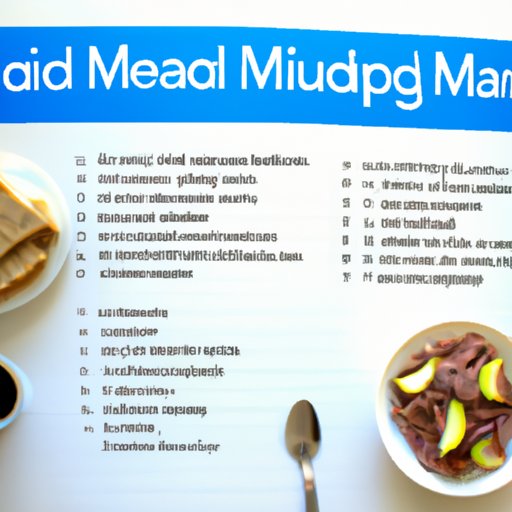Introduction
Eating before exercise has long been a topic of debate in the fitness world. While some people swear by it, others insist that eating before exercise is detrimental to performance. But what is the truth? In this article, we will explore the effects of eating before exercise, how long after eating you should wait, and what to consider when timing meals for optimal performance.
The Effects of Eating Before Exercise: How Long Should You Wait?
When deciding whether or not to eat before exercise, there are several factors to consider. For example, the type of exercise being done, the intensity of the exercise, and the individual’s dietary needs should all be taken into account. It is also important to understand the different effects of eating before exercise. Generally speaking, eating before exercise can provide an energy boost, help maintain blood sugar levels, and improve performance. However, if eaten too close to the start of exercise, the food may not have had enough time to digest and can cause digestive discomfort during exercise.
When it comes to deciding how long after eating to wait before exercising, there is no definitive answer. The amount of time needed depends on the type and intensity of the activity as well as the individual’s dietary needs. Generally speaking, it is recommended to wait at least two hours after eating a large meal and 30 minutes after eating a small snack before beginning exercise. This allows the body enough time to digest the food and convert it into energy.
Eating Before Exercise: What to Consider and When to Wait
When eating before exercise, it is important to consider the types of foods to eat. Complex carbohydrates and lean proteins are generally the best options, as they provide sustained energy and help keep hunger at bay during exercise. Fruits and vegetables are also good sources of vitamins and minerals, which can help support the body during strenuous activity. Avoiding high-fat and high-sugar foods before exercise is also recommended, as these can lead to a crash in energy levels.
Timing meals for optimal performance is also important. Eating a larger meal two to three hours before exercise and a smaller snack 30 minutes before exercise is generally recommended. This will ensure the body has enough energy to sustain the activity without feeling overly full or having digestive issues. It is also important to stay hydrated throughout the day, as dehydration can impair performance.
Is Eating Before Exercise a Good Idea? Exploring the Benefits and Drawbacks
While eating before exercise can provide a number of benefits, it is important to consider both the pros and cons. On the plus side, eating before exercise can give athletes an energy boost, help maintain blood sugar levels, improve performance, and reduce fatigue. Eating before exercise can also help athletes feel more energized and motivated to work out.
On the downside, eating too close to the start of exercise can cause digestive discomfort, such as cramping and bloating. Eating too much before exercise can also lead to feelings of sluggishness and fatigue. Additionally, eating certain types of food, such as high-fat and high-sugar foods, can cause a crash in energy levels during exercise.

Timing Your Meals for Maximum Performance: What to Know About Eating Before Exercise
To maximize performance, it is important to have a pre-exercise nutrition strategy. Pre-workout nutrition should include complex carbohydrates and lean proteins to provide sustained energy and keep hunger at bay during exercise. Fruits and vegetables are also good sources of vitamins and minerals, which can help support the body during strenuous activity. It is also important to avoid high-fat and high-sugar foods before exercise, as these can cause a crash in energy levels.
Post-workout nutrition is also important. After exercise, it is important to refuel with nutrient-dense foods, such as lean proteins, complex carbohydrates, and fruits and vegetables. These will help replenish energy stores and promote muscle recovery. Staying hydrated throughout the day is also essential for optimal performance.

Fuel Up Right: Strategies for Eating Before Exercise
Having a sample meal plan for eating before exercise can be helpful for those looking to fuel up properly. A typical pre-workout meal might include oatmeal with fruit, eggs and toast, or a protein shake with fruit and nuts. A post-workout meal could include grilled chicken with brown rice and vegetables, a turkey sandwich on whole wheat bread, or a yogurt parfait with granola and berries. It is also important to stay hydrated throughout the day, as dehydration can impair performance.
In addition to having a sample meal plan, there are a few tips to keep in mind when eating before exercise. First, make sure to eat at least two hours before exercise and 30 minutes before a small snack. Second, choose nutrient-dense foods that provide sustained energy and help keep hunger at bay. Third, avoid high-fat and high-sugar foods before exercise, as these can cause a crash in energy levels. Finally, stay hydrated throughout the day to ensure optimal performance.
Conclusion
Eating before exercise can provide a number of benefits, from providing an energy boost to helping maintain blood sugar levels. However, it is important to consider both the pros and cons before deciding whether or not to eat before exercise. When eating before exercise, it is important to choose nutrient-dense foods, such as complex carbohydrates and lean proteins, and to wait at least two hours after eating a large meal and 30 minutes after eating a small snack before beginning exercise. With proper planning and execution, eating before exercise can help athletes achieve their goals and perform at their peak.
(Note: Is this article not meeting your expectations? Do you have knowledge or insights to share? Unlock new opportunities and expand your reach by joining our authors team. Click Registration to join us and share your expertise with our readers.)
